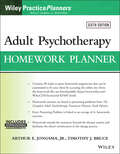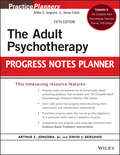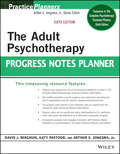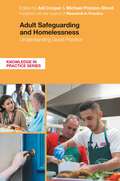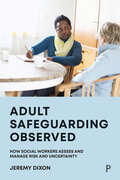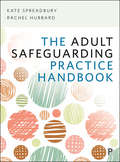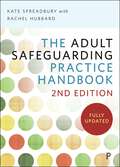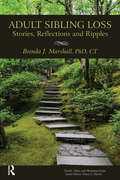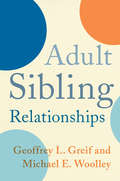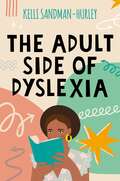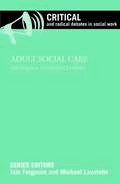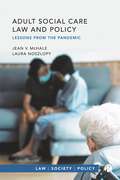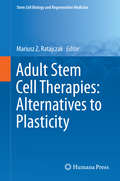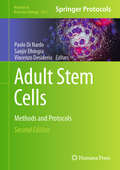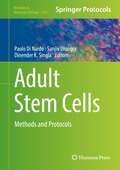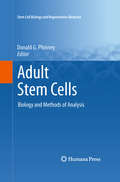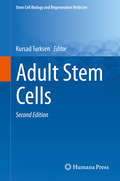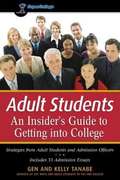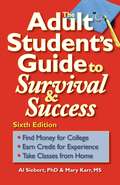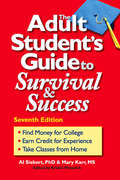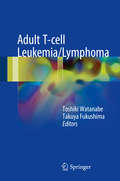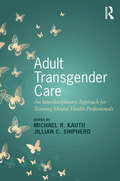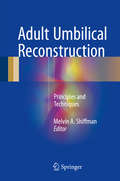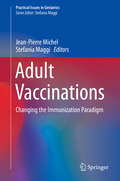- Table View
- List View
Adult Psychotherapy Homework Planner (PracticePlanners)
by Arthur E. Jongsma Jr. Timothy J. BruceFacilitate your client's involvement in change with 98 ready-to-print homework assignments The newly updated Sixth Edition of the Adult Psychotherapy Homework Planner offers practitioners a wide variety of ready-to-use assignments for adult clients in almost every therapeutic mode. Designed to be used with the Complete Adult Psychotherapy Treatment Planner, Sixth Edition, this planner saves time and energy otherwise spent studying, finding, or writing custom assignments for each client. The book is organized as a quick reference, with assignments grouped by behavioral problems like depression, anxiety, eating disorders, and more. It includes expert guidance on hw and when to make the most productive use of the exercises and is extensively cross-referenced to the corresponding treatment planner. This powerful resource includes: 92 ready-to-copy, customizable homework assignments that facilitate adult therapy Cross-references for each homework assignment to presenting problems from the Complete Adult Psychotherapy Treatment Planner, Sixth Edition New downloadable assignments from a supplementary online portal New homework assignments for opiod-related disorders and clients experiencing loneliness Perfect for psychologists, therapists, counselors, social workers, and psychiatrists, the latest edition of the Adult Psychotherapy Homework Planner is an indispensable resource for any mental health professional who works with adult clients.
The Adult Psychotherapy Progress Notes Planner
by David J. Berghuis Arthur E. Jongsma Jr.Save hours of time-consuming paperwork with the bestselling treatment planning system The Adult Psychotherapy Progress Notes Planner, Fifth Edition contains complete prewritten session and patient presentation descriptions for each behavioral problem in The Complete Adult Psychotherapy Treatment Planner, Fifth Edition. The prewritten progress notes can be easily and quickly adapted to fit a particular client need or treatment situation. Saves you hours of time-consuming paperwork, yet offers the freedom to develop customized progress notes Organized around 43 behaviorally based presenting problems, including depression, intimate relationship conflicts, chronic pain, anxiety, substance abuse, borderline personality, and more Features over 1,000 prewritten progress notes (summarizing patient presentation, themes of session, and treatment delivered) Provides an array of treatment approaches that correspond with the behavioral problems and DSM-5(tm) diagnostic categories in The Complete Adult Psychotherapy Treatment Planner, Fifth Edition Offers sample progress notes that conform to the requirements of most third-party payors and accrediting agencies, including CARF, The Joint Commission (TJC), COA, and the NCQA Identifies the latest evidence-based care treatments with treatment language following specific guidelines set by managed care and accrediting agencies
The Adult Psychotherapy Progress Notes Planner (PracticePlanners #299)
by David J. Berghuis Katherine Pastoor Arthur E. Jongsma Jr.Reduce paperwork and increase efficiency with this indispensable companion to the Complete Adult Psychotherapy Treatment Planner, Sixth Edition The newly revised sixth edition of The Adult Psychotherapy Progress Notes Planner, delivers complete prewritten session and patient presentation descriptions for each behavioral problem described in the Complete Adult Psychotherapy Treatment Planner, Sixth Edition. These prewritten progress notes can easily be adapted to fit a particular client need or treatment situation. The Progress Notes Planner will save you hours of time-consuming paperwork while allowing you to retain the flexibility you need to adapt your notes to each individual patient. The Planner is organized around the 44 behaviorally based problems found in the sixth edition of the Complete Adult Psychotherapy Treatment Planner, including depression, chronic pain, anxiety, and more. The Progress Notes Planner identifies the latest evidence-based treatment clinical interventions with language that satisfies the requirements of managed care and accrediting agencies, like CARF, TJC, COA, and the NCQA. The Progress Notes Planner also offers: Over 1000 prewritten progress notes summarizing patient presentation, the themes of the session, and the treatment delivered by the psychotherapist An array of treatment approaches that correspond to the behavioral problems and DSM-V diagnostic categories in Complete Adult Psychotherapy Treatment Planner, Sixth Edition An additional chapter designed to coordinate with the Treatment Planner chapter on loneliness Full coordination with the sixth edition of the Treatment Planner Perfect for any professional who performs psychotherapy with the Complete Adult Psychotherapy Treatment Planner, Sixth Edition, the sixth edition of The Adult Psychotherapy Progress Notes Planner will also earn a place on the bookshelves of professors and students of psychotherapy programs and courses, as well as any university or private professional school that trains counselors or psychotherapists.
Adult Safeguarding and Homelessness: Understanding Good Practice (Knowledge in Practice)
by Adi Cooper and Michael Preston-ShootThis one stop resource highlights evidence-informed practice and serves as an accessible and invaluable resource for all working with individuals experiencing multiple exclusion homelessness and adult safeguarding. This book brings together the best research evidence, service development knowledge, practice expertise and the voices of people with lived experience to help social workers and practitioners navigate the complex area of safeguarding adults and supporting adults with housing-related needs. It also is useful for managers and leaders in this field. Chapters range from contextualising the current landscape, evaluations of policy and reports to best practice for working with individuals, working together to safeguard individuals at risk to chapters on Leadership and Strategic Partnerships.
Adult Safeguarding Observed: How Social Workers Assess and Manage Risk and Uncertainty
by Jeremy DixonChapters 1, 3 and 5 are available Open Access under CC-BY licence. Safeguarding adults at risk of abuse or neglect is a core area of social work practice but knowledge of how social workers make adult safeguarding decisions is limited. Applying recent sociological and ethnographic research to this area for the first time, this book considers how adult safeguarding practice is developing, with a focus on risk management. The author explores how social workers conduct safeguarding adults assessments, work with multiple agencies and involve service users in risk decisions. The book is essential reading for those wishing to understand how risk and uncertainty are managed within frontline adult social work and how current practice can be improved.
The Adult Safeguarding Practice Handbook
by Kate Spreadbury Rachel HubbardThis is an essential, practical guide to best practice in adult safeguarding which supports students and practitioners to develop the skills, knowledge and ethical awareness to confidently address the challenges of adult safeguarding across a wide range of practice contexts in the UK. The authors explore the current context of adult safeguarding in the UK, together with the legislation, rights and principles that are the basis of best practice, and with a focus on developments in practice following the implementation of the Care Act (2014). Practitioners are supported to develop their practice by exploring new research and innovative ways of working within the field, while promoting the importance of learning from experience and building resilience in adult safeguarding work. This book includes: • helpful case studies and examples of professional decision making from experienced adult safeguarding practitioners • top tips and models to enable confident application of knowledge to practice • tools for reflection to extend the practitioner’s development
The Adult Safeguarding Practice Handbook 2e
by Kate SpreadburyThe second edition of this best-selling book provides an essential guide to best practice in adult safeguarding. It has been updated to include recent legislative, guidance and research-based developments and relates them to useful practice examples. Featuring new support materials and key case studies, it includes: • a focus on working with marginalised groups under the safeguarding and prevention duties, including ‘transitional’ safeguarding; • an exploration of best practice in light of changes to national guidance and research; • findings from a range of Safeguarding Adults Reviews with reflections on the outcomes of two national (England) Safeguarding Review Audits; and • an expansion of the concepts of professional curiosity and trauma-informed/-aware approaches. Students and practitioners are guided to reflect on practice and to extend their skills, knowledge and values to become confident and competent in the complex area of adult safeguarding.
Adult Sibling Loss: Stories, Reflections and Ripples (Death, Value and Meaning Series)
by Brenda J. Marshall"He was my best friend." "I feel like I've lost that one person I could always count on." Siblings know each other in ways friends and other blood relatives do not. They have shared bedrooms, bathrooms, holidays, family milestones, meals, and a way of growing up that those outside the family can never fully understand. The bond is intense, complicated, sometimes difficult, often wonderful and absolutely irreplaceable. When death interrupts what might have been a lovely, lifelong connection, the impact is tremendous. And yet, this loss is rarely the focus of research and is not well understood or recognised within society, leaving many siblings searching for appropriate support and validation. This book gives readers the opportunity to experience the intensity of this relationship through the eyes of three bereaved siblings. Their experiences, both before and after loss, are powerfully presented using a narrative style that allows the complexity and depth of their individual relationships to shine brightly. The author, a bereaved sibling herself, artfully weaves her story throughout, adding to the richness of the text. Through these collective stories, readers are invited to explore their own reactions and reflect on the many ways siblings affect each other over the long term. Bereaved siblings, clinicians, medical professionals, therapists, social workers, funeral directors, religious leaders, bereavement groups, and anyone who supports or knows a bereaved sibling will find benefit in this book. This highly readable text will both touch and inform readers.
Adult Sibling Relationships
by Geoffrey Greif Michael WoolleyThe bond siblings develop in childhood may be vastly different from the relationship that evolves in adulthood. Driven by affection but also characterized by ambivalence and ambiguity, adult sibling relationships can become hurtful, uncertain, competitive, or exhausting though the undercurrents of love and loyalty remain. An approach that recognizes the positive aspects of the changing sibling relationship, as well as those that need improvement, can restore healthy ties and rebuild family closeness.With in-depth case studies of more than 260 siblings over the age of forty and interviews with experts on mental health and family interaction, this book offers vital direction for traversing the emotional terrain of adult sibling relations. It pursues a richer understanding of ambivalence, a normal though little explored feeling among siblings, and how ambiguity about the past or present can lead to miscommunication and estrangement. For both professionals and general readers, this book clarifies the most confounding elements of sibling relationships and provides specific suggestions for realizing new, productive avenues of friendship in middle and later life—skills that are particularly important for siblings who must cooperate to care for aging parents or give immediate emotional or financial support to other siblings or family members.
The Adult Side of Dyslexia
by Kelli Sandman-HurleyThis book combines moving accounts of the lived experience of dyslexic adults with tips and strategies for surmounting the challenges you or a loved one or family member may face. Drawing on in-depth interviews, Kelli Sandman-Hurley explores common themes such as school experiences; the impact of dyslexia on mental wellbeing; literacy skills; and being a dyslexic parent, perhaps to a child who is also dyslexic. Interviewees share what helped them (or didn't), the strategies they use daily to tackle literacy-based tasks, anxiety and low self-esteem, the advice they would give to the parent of a dyslexic child who is struggling, and reflect on how their experience has impacted their own parenting style. Whether you're dyslexic yourself or supporting someone who is, this book sheds light on an underrepresented topic, providing much-needed guidance and insight around what life is really like for an adult with dyslexia.
Adult Social Care (Critical and Radical Debates in Social Work)
by Iain Ferguson ; Michael LavaletteAdult social care in Britain has been at the centre of much media and public attention in recent years. Revelations of horrific abuse in learning disability settings, the collapse of major private care home providers, abject failures of inspection and regulation, and uncertainty over how long-term care of older people should be funded have all given rise to serious public concern. In this short form book, part of the Critical and Radical Debates in Social Work series, Iain Ferguson and Michael Lavalette give an historical overview of adult social care. The roots of the current crisis are located in the under-valuing of older people and adults with disabilities and in the marketisation of social care over the past two decades. The authors critically examine recent developments in social work with adults, including the personalisation agenda, and the prospects for adult social care and social work in a context of seemingly never-ending austerity.
Adult Social Care Law and Policy: Lessons from the Pandemic (Law, Society, Policy)
by Jean V. McHale Laura NoszlopyAvailable Open Access digitally under CC-BY-NC-ND licence. This book provides an in-depth sociolegal examination of adult social care law and policy during the COVID-19 pandemic. It explores the tensions between legislation, policy, and practice in what was already an under-resourced and overstretched sector. The authors interrogate the vision and utility of the Care Act 2014 and explore the impact of emergency legislation and operational changes implemented during the pandemic. Detailing what happened to social care provision during this time of intense stress and turbulence – for people who draw on services, for informal carers, and for those who work in the sector – the book highlights fault lines in the system. This is an invaluable resource offering timely lessons for adult social care reform and future pandemic preparedness planning.
Adult Stem Cell Therapies: Alternatives To Plasticity (Stem Cell Biology and Regenerative Medicine #40)
by Mariusz Z. RatajczakThis timely volume explores various techniques for tissue and organ regeneration using stem cells isolated from adult tissues. It discusses alternative explanations of stem cell plasticity as well as current clinical results with adult stem cell therapies. It examines the presence of potential pluripotent stem cells in adult tissues, paracrine effects of stem cell therapies, and involvement of exosomes and microparticles into observed phenomena. Fifteen chapters, all written by noted leaders of their fields, focus on a variety of topics including cord blood and hematopoietic stem cells, skin and tissue organ regeneration, very small embryonic-like stem cells, and cell therapies in cardiology, neonatology, and neurology. Edited by Dr. Mariusz Ratajczak, an internationally known specialist in adult stem cell biology, Adult Stem Cell Therapies: Alternatives to Plasticity is an important addition to the Stem Cell Biology and Regenerative Medicine series.
Adult Stem Cells: Methods and Protocols (Methods in Molecular Biology #2835)
by Paolo Di Nardo Sanjiv Dhingra Vincenzo DesiderioThis second edition volume expands on the previous edition with updated chapters covering a broader range of tissues and techniques pertaining to stem cell technologies. The chapters also cover topics such as the generation of iPSC-derived cells unique to the individual human genome addressing the possibility of more personalized clinical applications to an individual with a specific degenerative disease; and the use of nanoparticles such as 3D scaffolds and biomaterials as a means of improving stem cell viability after transplantation in the host tissue. Written in the highly successful Methods in Molecular Biology series format, chapters include introductions to their respective topics, lists of the necessary materials and reagents, step-by-step, readily reproducible laboratory protocols, and tips on troubleshooting and avoiding known pitfalls. Cutting-edge and authoritative, Adult Stem Cells: Methods and Protocols, Second Edition introduces insights into personalized medicine in stem cell therapies, and will spark new and innovative procedures relevant to stem cell therapy and tissue engineering.
Adult Stem Cells: Methods and Protocols (Methods in Molecular Biology #1553)
by Paolo Di Nardo Sanjiv Dhingra Dinender K. SinglaStem cell research and technology represent a major challenge for treating otherwise non-curable patients. A decade of intensive research has demonstrated that initial hopes based more on the will to succeed than on solid scientific bases can be translated into factual techniques only by adopting more rigorous procedures and strategies. Among other major impediments, the failure so far experienced in applying stem cell technologies to repair parenchymal organs can be ascribed to the lack of sufficient knowledge of basic mechanisms but also to the lack of standardized criteria and protocols. Each laboratory often follows its own "recipe," using erratic nomenclature and non-comparable, if not confusing, experimental protocols. All of this makes it difficult to learn from the others and, ultimately, hampers the advancement of knowledge on stem cell behavior. The ambitious goal of this book is to gather the most innovative and scientifically robust knowledge and technologies on stem cells and to involve investigators from academies and industries in order to formulate recommendations that could standardize the isolation and manipulation of stem cells using solid and well-documented knowledge rather than fragmentary and often unrepeatable experimental reports.
Adult Stem Cells: Biology and Methods of Analysis (Stem Cell Biology and Regenerative Medicine)
by Donald G. PhinneyThis is comprehensive overview of a vital area of scientific enquiry, which covers a broad spectrum of issues. With contributions from some of the key researchers in the field, Adult Stem Cells: Biology and Methods of Analysis offers readers a historical perspective as well as unique insights into cutting-edge thoughts. The volume contextualizes the recent discovery of stem/progenitor cell populations resident in many adult tissues and organs. It confronts the complexities scientists face in trying to validate these cells, while it also describes and critically evaluates the methods currently used to assess stem cell self-renewal. The chapters also seek to distinguish this process from other aspects of cell survival, such as the regulation of life span, senescence, and immortalization at a molecular level. The monograph begins with a section that examine the basic biology of adult stem cells, including chapters on the emerging role of microRNAs in regulating their fate and the molecular mechanisms that govern their self-renewal, the book moves on to analyze the varying methodologies employed in characterizing these elusive elements of our genetic make-up. The second section details in-vivo lineage tracing of tissue-specific stem cells, explores the neural stem cell paradigm, and considers the function of ABC transporters and aldehyde dehydrogenase in adult stem-cell biology. The final section shifts the focus to the life-span regulation and immortalization and features a chapter on the cancer stem cell paradigm. This is an authoritative volume on one of the frontiers of genetic research, and will serve as a valuable resource, not just for established scientists but also for those now entering the field of stem cell biology.
Adult Stem Cells (Stem Cell Biology and Regenerative Medicine)
by Kursad TurksenAdult Stem Cells, second edition, takes a critical look at issues concerning the developmental or differentiation potential for a variety of tissue types and for specific adult stem cell types. Since the first edition appeared a decade ago, our understanding of adult stem cells, and more specifically tissue-specific adult stem cells, has advanced tremendously. And an increased interest in regenerative medicine and potential stem cell applications has driven a quest for better understanding of stem cell biology. In turn, this has spawned much activity on generation and utilization of more and better reagents to identify and isolate stem cells and stem cell-like subpopulations, and on assays elucidating their developmental or differentiation potential and functional integration with host tissues and organs. In this fully updated new edition, chapters cover topics ranging from signaling pathways maintaining stemness in hematopoietic cells to regeneration after injury and endocrine mechanisms underlying the stem cell theory of aging. Other chapters cover stem cells by organ or system including pituitary, cardiac, epithelial, teeth, lung, ovary, prostate, liver, and many more. Importantly, the authors of the chapters have not only summarized their successes, but have also summarized some of the difficulties that each particular field is still facing with respect to maximizing the utility of stem cells in clinical settings. Collectively, they impart both the excitement and challenges facing stem cell utilization for repair and regeneration making this book essential reading for those involved in stem cell research as well as those involved in clinical assays.
Adult Students: An Insider's Guide to Getting into College
by Gen Tanabe Kelly TanabeWhether you are going back to school for the first time, returning after an absence or advancing or changing your career, this book will help. Adult Students guides you step-by-step through the entire admission process from making the decision to return to college to gaining admission to figuring out how to pay the tuition bills.
The Adult Student's Guide to Survival & Success
by Mary Karr Al SiebertWhether enrolling in college for the first time or returning after an extended absence, this motivational guide provides adult students with a wealth of practical guidance. This thorough handbook explores not only how to succeed academically while balancing family, work, and other important responsibilities, but also addresses how students can learn to confront their fears, increase their self-confidence and resiliency, and create support groups. Containing essential information on financing education through loans, grants, and scholarships as well as practical tips for managing time, preparing for tests, taking effective notes, and using internet resources, this one-stop reference also includes action review checklists.
The Adult Student's Guide to Survival & Success
by Al Siebert Mary Karr Kristin PintarichWhether enrolling in college for the first time or returning after an extended absence, this one-stop reference provides adult students with a wealth of practical guidance once they hit campus--either brick and mortar or online. This thorough guide explores not only how to succeed academically while balancing family, work, and other important responsibilities, but also addresses how students can learn to confront their fears, increase their self-confidence and resiliency, and create learning support groups. The handbook contains essential information on financing education through loans, grants, and scholarships, as well as practical tips for managing time, preparing for tests, taking effective notes, and using internet resources. Now in its seventh edition, The Adult Student's Guide to Survival & Success has both stood the test of time and evolved with it.
Adult T-cell Leukemia/Lymphoma
by Toshiki Watanabe Takuya FukushimaThis book provides essential information on the epidemiology, molecular and genetic features, anti-CCR4 antibody therapy and a nationwide study of transplantation on human T-leukemia virus type-I (HTLV-1) and adult T-cell leukemia/lymphoma (ATL). This rare but important disease has restricted endemic areas and distinct clinical features such as a high frequency of hypercalcemia, strong predisposition to infection and poor response to chemotherapy, aspects which set ATL apart from other types of non-Hodgkin lymphoma. Given the small number of patients, enrollment in clinical trials has not been feasible, and establishing treatment standard has been difficult but new evidence, such as results of nationwide studies on transplantation, have shown new insights and potential treatments. Based on recent evidence, the book presents new treatment methods for ATL and infection prevention of HTLV-1, enabling clinicians, researchers and post-docs specializing in hematology and virology to gain a valuable overview of the disease.
Adult Time: A Baby Blues Collection (Baby Blues Ser.)
by Rick Kirkman Jerry ScottMeet the MacPherson family and enter their realm of chaos with this collection of the much-loved, long-running comic strips!From the frazzled nerves of sleep deprivation to the cacophony of a tri-kid family, Baby Blues reveals the true dark underbelly of parenting to the delight of newspaper readers everywhere. Like a comic epidural, or butt cream on a raging diaper rash, this comic strip has helped take some of the sting out of parenting for moms and dads around the world.Baby Blues transcends the comic page by fusing the award-winning imaginations of Rick Kirkman and Jerry Scott with familiar family life. Kirkman and Scott intuitively balance the humorous with the poignant through relatable—and sometimes all-too-familiar—parenting scenes.
Adult Transgender Care: An Interdisciplinary Approach for Training Mental Health Professionals
by Michael R. Kauth and Jillian C. ShipherdAdult Transgender Care provides an overview of transgender health and offers a comprehensive approach to training mental health professionals in transgender care. The book takes an interdisciplinary approach to transgender care, emphasizing the complementary contributions of psychiatry, psychology, and social work in providing transgender care within an integrated treatment team. Included in this text are overviews of how to conceptualize and provide treatment with complex and difficult clinical presentations and considerations for understanding how to address system-level challenges to treatment. Adult Transgender Care meets a unique need by providing detailed information, clinical interventions, case studies, and resources for mental health professionals on transgender care.
Adult Umbilical Reconstruction: Principles and Techniques
by Melvin A. ShiffmanThis book starts with a description of the anatomy of the umbilicus and its ideal shape. After a brief summary of the history of umbilical reconstruction, currently used umbilical reconstructive techniques are presented. The reader will also find information on the reconstruction of the umbilicus after malignant melanoma; outcomes and complications will be discussed in the last chapters. Written by respected authors, this book will offer residents and fellows as well as practicing and highly experienced plastic surgeons essential guidance on treatment and decision-making concerning umbilical reconstruction. Its numerous illustrations and clearly structured content make the book a must-read. Written by respected expertsProvides a clear overview of the surgical techniques currently used for umbilical reconstructionAddresses beginners and experienced surgeons in the fields of plastic surgery, general surgery, cosmetic surgery and breast surgery
Adult Vaccinations: Changing the Immunization Paradigm (Practical Issues in Geriatrics)
by Jean-Pierre Michel Stefania MaggiAfter introductory chapters devoted to the safe production and distribution of vaccines, the book addresses the question of adult vaccination in the framework of a life-course approach to vaccination. It presents the proceedings of multidisciplinary expert discussions with an excellent summary of the current state of knowledge on adult vaccination in various diseases, as well as an overview of the professionals involved and the obstacles to achieving greater vaccine uptake, and how these may be addressed.The book systematically discusses the major vaccine-preventable diseases, as well as regulatory issues in vaccine provision, and presents the results of an expert meeting designed to identify the obstacles to vaccination, and solutions for addressing these barriers. It goes on to extend the discussion beyond the traditional boundaries of human health to encompass the “one health” concept.The book is intended for all those with an interest in vaccination, including physicians (from a wide range of disciplines including geriatrics/gerontology, infectious diseases, pediatrics, internal medicine, and other non-organ specialties), other healthcare professionals, pharmacists, representatives of the pharmaceutical industry and regulatory bodies (EMEA, national authorities), policymakers, the media and the general public.
